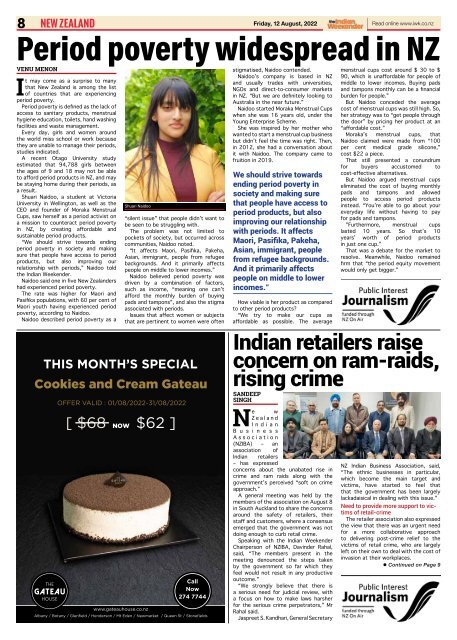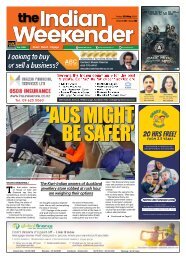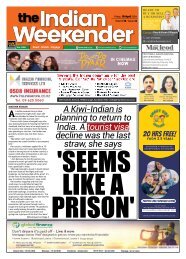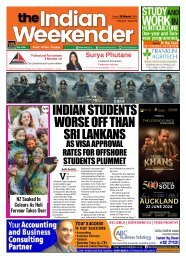The Indian Weekender
Create successful ePaper yourself
Turn your PDF publications into a flip-book with our unique Google optimized e-Paper software.
8<br />
NEW ZEALAND<br />
Friday, 12 August, 2022<br />
Read online www.iwk.co.nz<br />
Period poverty widespread in NZ<br />
VENU MENON<br />
It may come as a surprise to many<br />
that New Zealand is among the list<br />
of countries that are experiencing<br />
period poverty.<br />
Period poverty is defined as the lack of<br />
access to sanitary products, menstrual<br />
hygiene education, toilets, hand washing<br />
facilities and waste management.<br />
Every day, girls and women around<br />
the world miss school or work because<br />
they are unable to manage their periods,<br />
studies indicated.<br />
A recent Otago University study<br />
estimated that 94,788 girls between<br />
the ages of 9 and 18 may not be able<br />
to afford period products in NZ, and may<br />
be staying home during their periods, as<br />
a result.<br />
Shuari Naidoo, a student at Victoria<br />
University in Wellington, as well as the<br />
CEO and founder of Moraka Menstrual<br />
Cups, saw herself as a period activist on<br />
a mission to counteract period poverty<br />
in NZ, by creating affordable and<br />
sustainable period products.<br />
“We should strive towards ending<br />
period poverty in society and making<br />
sure that people have access to period<br />
products, but also improving our<br />
relationship with periods,” Naidoo told<br />
the <strong>Indian</strong> <strong>Weekender</strong>.<br />
Naidoo said one in five New Zealanders<br />
had experienced period poverty.<br />
<strong>The</strong> rate was higher for Maori and<br />
Pasifika populations, with 60 per cent of<br />
Maori youth having experienced period<br />
poverty, according to Naidoo.<br />
Naidoo described period poverty as a<br />
Shuari Naidoo<br />
“silent issue” that people didn’t want to<br />
be seen to be struggling with.<br />
<strong>The</strong> problem was not limited to<br />
pockets of society, but occurred across<br />
communities, Naidoo noted.<br />
“It affects Maori, Pasifika, Pakeha,<br />
Asian, immigrant, people from refugee<br />
backgrounds. And it primarily affects<br />
people on middle to lower incomes.”<br />
Naidoo believed period poverty was<br />
driven by a combination of factors,<br />
such as income, “meaning one can’t<br />
afford the monthly burden of buying<br />
pads and tampons”, and also the stigma<br />
associated with periods.<br />
Issues that affect women or subjects<br />
that are pertinent to women were often<br />
THIS MONTH’S SPECIAL<br />
Cookies and Cream Gateau<br />
OFFER VALID : 01/08/2022~31/08/2022<br />
[ $68 NOW $62 ]<br />
www.gateauhouse.co.nz<br />
Call<br />
Now<br />
274 7744<br />
Albany / Botany / Glenfield / Henderson / Mt Eden / Newmarket / Queen St / Stonefields<br />
stigmatised, Naidoo contended.<br />
Naidoo’s company is based in NZ<br />
and usually trades with universities,<br />
NGOs and direct-to-consumer markets<br />
in NZ. “But we are definitely looking to<br />
Australia in the near future.”<br />
Naidoo started Moraka Menstrual Cups<br />
when she was 16 years old, under the<br />
Young Enterprise Scheme.<br />
She was inspired by her mother who<br />
wanted to start a menstrual cup business<br />
but didn’t feel the time was right. <strong>The</strong>n,<br />
in 2012, she had a conversation about<br />
it with Naidoo. <strong>The</strong> company came to<br />
fruition in 2019.<br />
We should strive towards<br />
ending period poverty in<br />
society and making sure<br />
that people have access to<br />
period products, but also<br />
improving our relationship<br />
with periods. It affects<br />
Maori, Pasifika, Pakeha,<br />
Asian, immigrant, people<br />
from refugee backgrounds.<br />
And it primarily affects<br />
people on middle to lower<br />
incomes."<br />
How viable is her product as compared<br />
to other period products?<br />
“We try to make our cups as<br />
affordable as possible. <strong>The</strong> average<br />
menstrual cups cost around $ 30 to $<br />
90, which is unaffordable for people of<br />
middle to lower incomes. Buying pads<br />
and tampons monthly can be a financial<br />
burden for people.”<br />
But Naidoo conceded the average<br />
cost of menstrual cups was still high. So,<br />
her strategy was to “get people through<br />
the door” by pricing her product at an<br />
“affordable cost.”<br />
Moraka’s menstrual cups, that<br />
Naidoo claimed were made from “100<br />
per cent medical grade silicone,”<br />
cost $22 a piece.<br />
That still presented a conundrum<br />
for buyers accustomed to<br />
cost-effective alternatives.<br />
But Naidoo argued menstrual cups<br />
eliminated the cost of buying monthly<br />
pads and tampons and allowed<br />
people to access period products<br />
instead. “You’re able to go about your<br />
everyday life without having to pay<br />
for pads and tampons.<br />
"Furthermore, menstrual cups<br />
lasted 10 years. So that’s 10<br />
years’ worth of period products<br />
in just one cup.”<br />
That was a debate for the market to<br />
resolve. Meanwhile, Naidoo remained<br />
firm that “the period equity movement<br />
would only get bigger.”<br />
<strong>Indian</strong> retailers raise<br />
concern on ram-raids,<br />
rising crime<br />
SANDEEP<br />
SINGH<br />
Ne w<br />
Zealand<br />
<strong>Indian</strong><br />
B u s i n e s s<br />
Association<br />
(NZIBA) – an<br />
association of<br />
<strong>Indian</strong> retailers<br />
– has expressed<br />
concerns about the unabated rise in<br />
crime and ram raids along with the<br />
government’s perceived “soft on crime<br />
approach.”<br />
A general meeting was held by the<br />
members of the association on August 8<br />
in South Auckland to share the concerns<br />
around the safety of retailers, their<br />
staff and customers, where a consensus<br />
emerged that the government was not<br />
doing enough to curb retail crime.<br />
Speaking with the <strong>Indian</strong> <strong>Weekender</strong><br />
Chairperson of NZIBA, Davinder Rahal,<br />
said, “<strong>The</strong> members present in the<br />
meeting denounced the steps taken<br />
by the government so far which they<br />
feel would not result in any productive<br />
outcome.”<br />
“We strongly believe that there is<br />
a serious need for judicial review, with<br />
a focus on how to make laws harsher<br />
for the serious crime perpetrators,” Mr<br />
Rahal said.<br />
Jaspreet S. Kandhari, General Secretary<br />
NZ <strong>Indian</strong> Business Association, said,<br />
“<strong>The</strong> ethnic businesses in particular,<br />
which become the main target and<br />
victims, have started to feel that<br />
that the government has been largely<br />
lackadaisical in dealing with this issue.”<br />
Need to provide more support to victims<br />
of retail-crime<br />
<strong>The</strong> retailer association also expressed<br />
the view that there was an urgent need<br />
for a more collaborative approach<br />
to delivering post-crime relief to the<br />
victims of retail crime, who are largely<br />
left on their own to deal with the cost of<br />
invasion at their workplaces.<br />
• Continued on Page 9


















